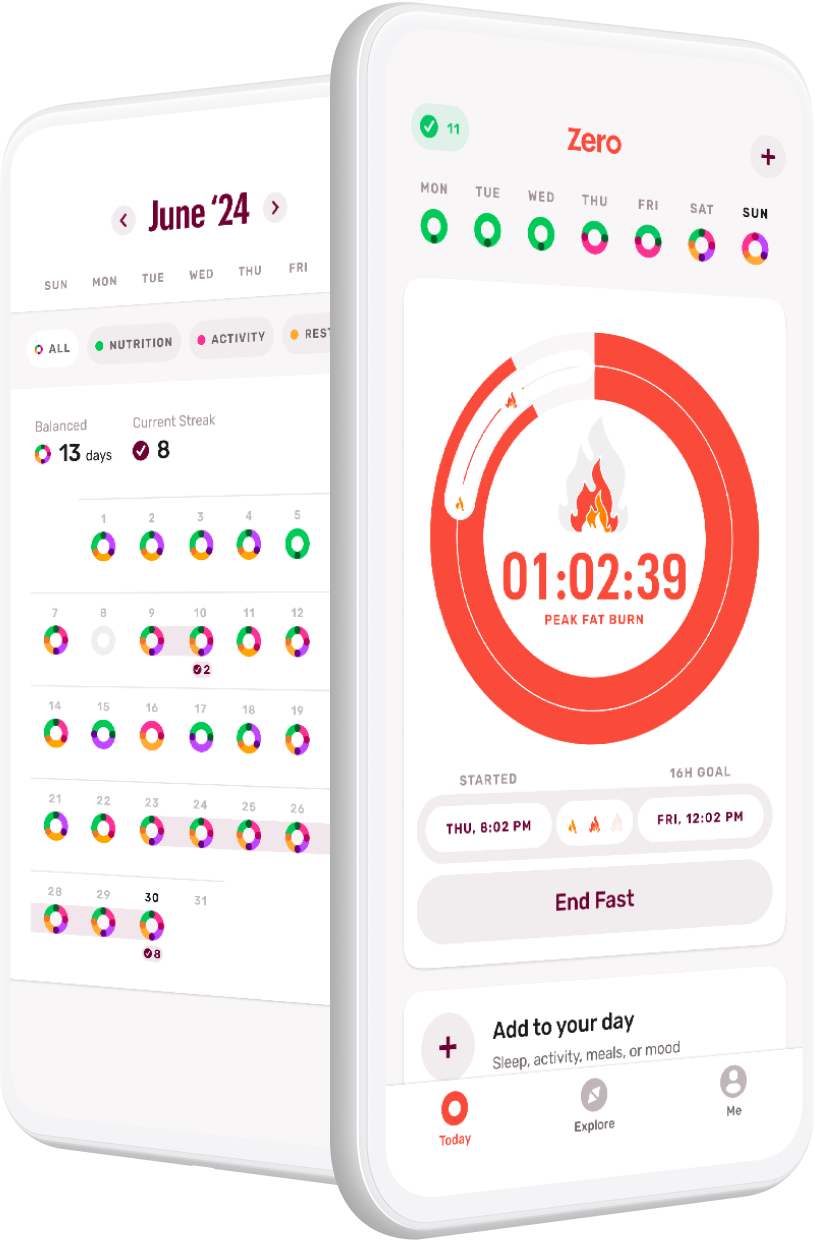Written and medically reviewed by Nicole Grant, RD
Ah, the holidays. When your social calendar fills up and, everywhere you look, there’s a big plate of buttery, drool-worthy cookies calling your name. If you’ve been working on your health lately, this time of year can feel challenging. What will happen when you’re at the mercy of others’ cooking or feel overly tempted by all the sweet treats?
The truth is, you probably aren’t going to get through the holidays without eating a few cookies or a slice of pie — nor should you! But that doesn’t mean you have to put your health goals on pause until January 1. One of the biggest benefits that fasting provides, especially around special occasions, is the flexibility to make health gains while still enjoying the festivities.
So, here at Zero, we say: Do indulge. Partake in the fun! Just do so mindfully, and here’s how.
3 Tips to Navigate Holiday Food Environments
#1) Start Your Timer
Studies have shown that regular fasting reduces overall caloric intake — so, if you’re going to be a bit more liberal with your food choices around holiday mealtimes, consider using intermittent fasting to keep your nutrition in balance. For example, maybe you know there’s a big, festive dinner planned. On that day, consider skipping breakfast and putting off your first meal until midday, so your fast extends into the 12–18-hour range and your window for consuming calories is contained within the latter part of the day (when you’ll enjoy that delicious dinner!).
#2) Be Mindful of Your Portions
Absolutely say yes to your Aunt Sally’s famous Christmas trifle — but maybe don’t say yes to seconds. During a holiday meal, a bit of indulgence can be expected; however, you may feel like your meals are more successful when you feel confident in your portion-size choices. Staying aware of what you’re eating, sitting down to a meal with clear intentions (such as setting a one-plate rule), and using tools like the hunger-fullness scale can help you manage how much you eat without the need to track each calorie.
Another thing to consider: That second helping of sugary goodness is likely to happen long after the first, and far closer to bedtime. Studies have shown that stopping food intake 2–4 hours before bed significantly impacts your sleep quality, which can impact energy levels, productivity, and happiness. So, saying no to seconds and starting your fast at least two hours before bed will help you get a better night’s sleep… which means you’ll enjoy tomorrow’s festivities even more.
#3) Get Moving
Food can be social, but so can exercise! Schedule family hikes, walks around the block, or other winter activities that get your heart rate up. Bonus points if you schedule those activities in the morning, while you’re still fasting. When you exercise towards the end of your fast, it accelerates your rate of fat burning, which has a whole host of positive downstream effects, including weight loss, better energy, and a stabler mood. By exercising before your fast ends, you’ll not only burn more fat while you exercise, but your fat-burn rate will remain elevated even after that session is complete!
If morning exercise is an impossibility, try “exercise snacking” throughout the day, especially after meals. An effective bout can be as short as 20–40 seconds of effort as long as that effort is high! And remember: Cardio doesn’t have to be on a treadmill. Running up the hill with a sled in hand so you can race the kids back down works just as well, and you won’t need to store those excess calories if you’re burning them off in a high-energy snowball fight.
Conclusion: Holidays and Health Need Not Be Mutually Exclusive.
If you’re using fasting as one of several tools to take charge of your health, you’re already way ahead of the curve. The holidays are a time to celebrate, be with family, and enjoy some traditional holiday cuisine, and you don’t have to sacrifice your health to do any of those things.
Happy fasting (and holidays) from all of us at Zero!
- 4 Easy Tips to Burn Fat Faster - July 3, 2024
- Why Should We Care About Hormones? Fasting and Hormone Health - April 1, 2024
- Should You Consider a Continuous Glucose Monitor (CGM) If You’re Non-Diabetic? - March 18, 2024

